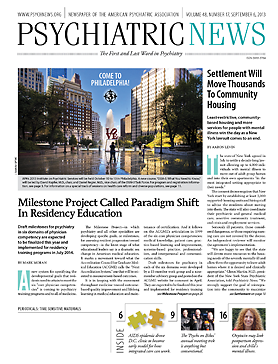We would like to correct several errors in the article “Case Shows How Lyme Disease Can Mimic New-Onset Panic Disorder” in the July 3 issue.
The case highlighted in the article was incorrectly presented as “chronic” Lyme disease, when in fact the clinical presentation and laboratory findings were not consistent with Lyme disease. Panic attacks and transient left-sided body numbness are not documented symptoms of Borrelia burgdorferi infection, and the patient had four negative ELISA tests. The Western blot test—which should be performed only as a second-tier test if the ELISA is positive or equivocal—was performed seven months after the purported tick exposure and still did not meet the recommended criteria of 5 out of 10 antibody bands for a positive test.
Jarisch-Herxheimer reactions occur within the first 24 hours of initiating antibiotic therapy for certain bacterial infections. There is no convincing evidence that Jarisch-Herxheimer reactions are prolonged in Lyme disease or can cause the atypical symptoms described in the case patient.
Finally, Lyme disease is not a “clinical diagnosis regardless of serology findings.” Lyme disease is a clinical diagnosis only in patients with an erythema migrans rash who live in or have traveled to an endemic area; otherwise, the diagnosis should be supported by two-tier serologic testing using FDA-cleared methods.
Health care providers are encouraged to follow evidence-based guidelines for diagnosis and treatment of Lyme disease. For more information, please visit
http://www.cdc.gov/lyme.
CENTERS FOR DISEASE CONTROL AND PREVENTION
Response from Yu Dong M.D., Ph.D., a psychosomatic medicine fellow at George Washington University.
I understand that diagnosing Lyme disease is a very controversial topic. The intent of this case report was to encourage early recognition and treatment of Lyme disease in order to prevent progression to late/chronic Lyme disease.
The symptoms described in the case were all within early disseminated stage (May 2012 to August 2012); and the four negative ELISA tests were all within one to two months after the tic bite. According to the CDC website, the sensitivity of ELISA is 30 percent in the early stage and 60 percent in the early disseminated stage, and IgG is usually 100 percent positive in the late stage. Low sensitivity of ELISA in the early stages will result in high rates of false negative serology finding. So if we completely rely on serology findings for diagnosis, patients may miss the chance for early treatment, which is more effective.
I agree with following the evidence-based guidelines for diagnosis and treatment of Lyme disease. The statement of “most literature recommends clinical diagnosis regardless of serology findings” is in the context of early diagnosis and treatment within the early disseminated stage.
I truly appreciate the CDC’s clarifying some of the confusion. ■
